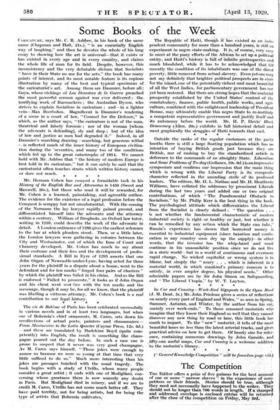Outside the ranks of the regular customers at the party
booths there is still a large floating population which has no intention of buying British goods just because they are British, nor of rushing to buy the standardized article in deference to the commands of an almighty State. Liberalism and Some Problems of To-day (Gollancz, 10s. ed.) is an impressive symposium and confirms our impression that the main thing which is wrong with the Liberal Party is its composite character reflected in the unending strife of its professed leaders. The editors, Mr. H. L. Nathan and Mr. H. Heathcote Williams, have collated the addresses by prominent Liberals during the last two years and added one or two original contributions, of which " The Fundamental Obstacle to Socialism," by Mr. Philip Kerr is the best thing in the book. The psychological attitude which differentiates the Liberal from the Socialist is clearly defined,: " The question . . . is not whether the fundamental characteristic of modern industrial society is right or _healthy or just, but whether it can be remedied by any action which the State can take." Russia's experience has shown that borro-wed money is essential to industrial equipment (since taxation and confis- cation in any country soon dry up the supply)—in other words, that the investor has the whip-hand and must continue in his unassailable position since we do not live in a static world—but in a world of ,continuous and evermore rapid change. No wicked capitalist or wrong system is to blame, but simply the " usury . . . which is inherent in a material world, in which mankind's primary concern is to satisfy, in ever ampler degree, his physical needs." Other admirable papers are by Sir John Simon on Safeguarding, and The Liberal Utopia'," by W. 1'. Layton. :* * *


















































 Previous page
Previous page